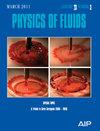Experimental investigation on the gas pressure influence laws and mechanical mechanism of coal and gas outbursts
IF 4.1
2区 工程技术
Q1 MECHANICS
引用次数: 0
Abstract
With the increasing frequency and intensity of coal and gas outburst disasters under deep mining conditions, studying the outburst mechanism of occurrence has great significance for outbursts prevention and control. The evolution law of coal and gas outbursts under different gas pressure is proposed. The outbursts law is analyzed utilizing the self-developed simulation experiment system of coal and gas outbursts, and the simulation experiment is carried out under the gas pressure of 0.45, 0.8, and 1.5 MPa. In the experiment, the gas pressure drops curves, the relative intensity change, the interval distribution of coal powder, and the evolution of outburst hole and the migration rate of coal powder are analyzed. The results indicate that (1) the gas pressure detected by the No. 4 gas pressure sensor starts to drop first; (2) the gas pressure is positively proportional to the relative outburst intensity. When the gas pressure increases from 0.45 to 0.80 MPa and then to 1.5 MPa, the farthest outburst distance of coal powder increases from 10 to 15 m and then to 21 m, and the corresponding relative outburst intensity increases from 22.94% to 35.74% and then to 45.73%, respectively. (3) The average proportion of coal particles size less than 0.28 mm and larger than 1 mm under each corresponding outburst interval is 40.75% and 22.53%, respectively. Experimental results show that the gas pressure plays an essential role in the secondary crushing and pulverization of coal samples during the outburst process. (4) The throwing velocity of the pulverized coal is increased with the gas pressure near the outburst hole. When the gas pressure is 0.8 MPa, the throwing velocity of pulverized coal reaches the maximum value of 32.40 m/s. (5) The dimensional characteristics and the location initiation of the outburst hole are obtained. The results showed that the outburst process of coal is mainly in two failure forms: pulverization and spallation. The research results provide a theoretical basis and test data support for the prevention and control of coal and gas outburst disasters.煤与瓦斯突出的瓦斯压力影响规律及力学机理实验研究
随着深部开采条件下煤与瓦斯突出灾害发生频率和强度的增加,研究其发生机理对防治突出具有重要意义。提出了不同瓦斯压力下煤与瓦斯突出的演化规律。利用自主研发的煤与瓦斯突出模拟实验系统,在瓦斯压力为 0.45、0.8 和 1.5 MPa 的条件下进行了模拟实验,分析了煤与瓦斯突出规律。实验中分析了瓦斯压力下降曲线、相对强度变化、煤粉间隔分布、爆发孔演化及煤粉迁移率。结果表明:(1) 4 号瓦斯压力传感器检测到的瓦斯压力首先开始下降;(2) 瓦斯压力与相对爆破强度成正比。当瓦斯压力从 0.45 MPa 增加到 0.80 MPa,再增加到 1.5 MPa 时,煤粉的最远喷出距离从 10 米增加到 15 米,再增加到 21 米,相应的相对喷出强度分别从 22.94%增加到 35.74%,再增加到 45.73%。(3) 在每个相应的爆发区间内,小于 0.28 mm 和大于 1 mm 的煤粒平均比例分别为 40.75% 和 22.53%。实验结果表明,瓦斯压力在爆破过程中对煤样的二次破碎和粉碎起着至关重要的作用。(4) 煤粉的抛掷速度随爆破孔附近瓦斯压力的增加而增加。当瓦斯压力为 0.8 MPa 时,煤粉的抛掷速度达到最大值 32.40 m/s。(5) 获得了爆破孔的尺寸特征和位置起始。结果表明,煤的爆破过程主要有两种破坏形式:粉化和剥落。研究成果为防治煤与瓦斯突出灾害提供了理论依据和试验数据支持。
本文章由计算机程序翻译,如有差异,请以英文原文为准。
求助全文
约1分钟内获得全文
求助全文
来源期刊

Physics of Fluids
物理-力学
CiteScore
6.50
自引率
41.30%
发文量
2063
审稿时长
2.6 months
期刊介绍:
Physics of Fluids (PoF) is a preeminent journal devoted to publishing original theoretical, computational, and experimental contributions to the understanding of the dynamics of gases, liquids, and complex or multiphase fluids. Topics published in PoF are diverse and reflect the most important subjects in fluid dynamics, including, but not limited to:
-Acoustics
-Aerospace and aeronautical flow
-Astrophysical flow
-Biofluid mechanics
-Cavitation and cavitating flows
-Combustion flows
-Complex fluids
-Compressible flow
-Computational fluid dynamics
-Contact lines
-Continuum mechanics
-Convection
-Cryogenic flow
-Droplets
-Electrical and magnetic effects in fluid flow
-Foam, bubble, and film mechanics
-Flow control
-Flow instability and transition
-Flow orientation and anisotropy
-Flows with other transport phenomena
-Flows with complex boundary conditions
-Flow visualization
-Fluid mechanics
-Fluid physical properties
-Fluid–structure interactions
-Free surface flows
-Geophysical flow
-Interfacial flow
-Knudsen flow
-Laminar flow
-Liquid crystals
-Mathematics of fluids
-Micro- and nanofluid mechanics
-Mixing
-Molecular theory
-Nanofluidics
-Particulate, multiphase, and granular flow
-Processing flows
-Relativistic fluid mechanics
-Rotating flows
-Shock wave phenomena
-Soft matter
-Stratified flows
-Supercritical fluids
-Superfluidity
-Thermodynamics of flow systems
-Transonic flow
-Turbulent flow
-Viscous and non-Newtonian flow
-Viscoelasticity
-Vortex dynamics
-Waves
 求助内容:
求助内容: 应助结果提醒方式:
应助结果提醒方式:


